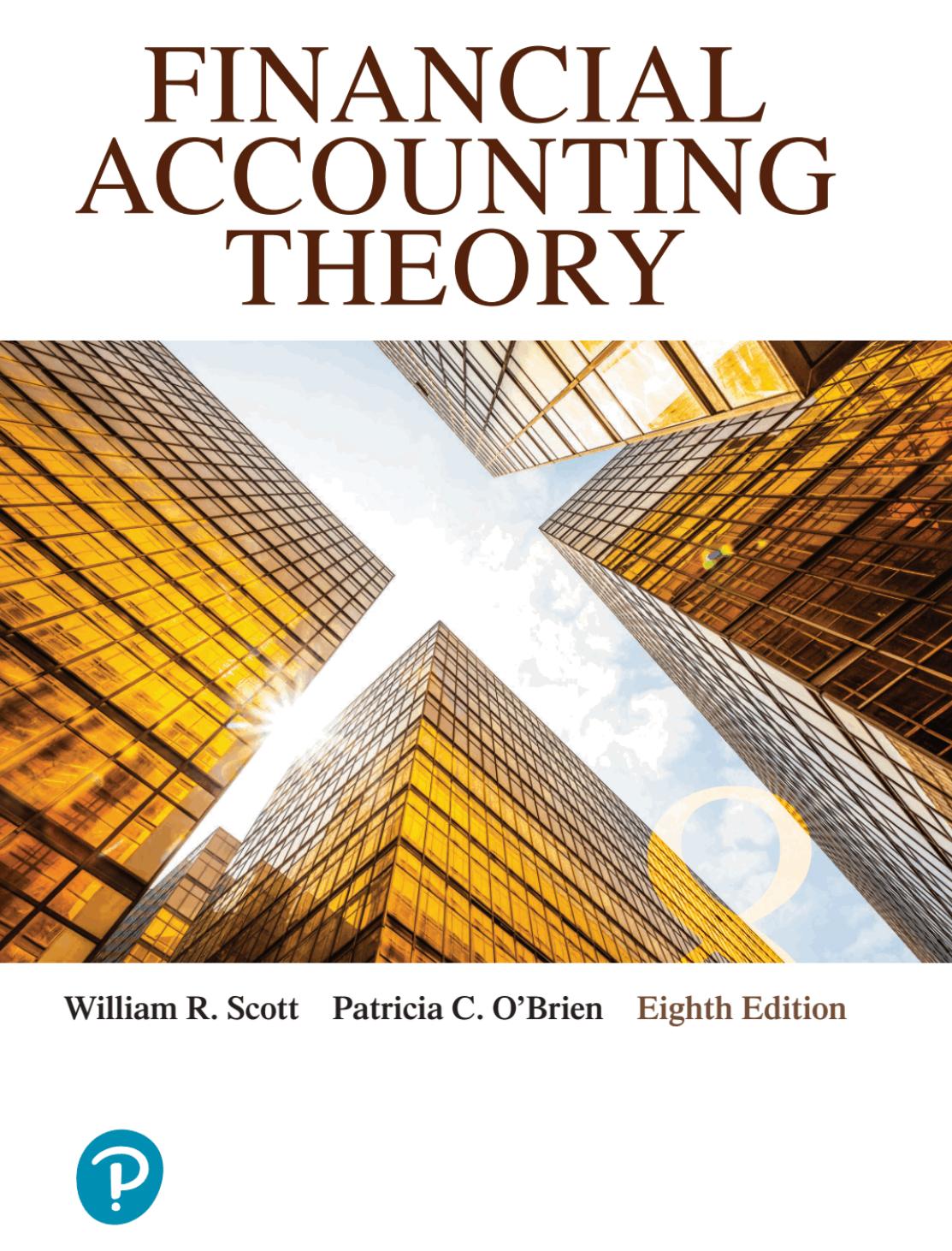Financial Accounting Theory 8th Edition by William Scott, Patricia O’Brien ISBN 0135357403 9780135357408
$70.00 Original price was: $70.00.$35.00Current price is: $35.00.
Instant download Financial Accounting Theory 8th Edition after payment
Financial Accounting Theory 8th Edition by William Scott, Patricia O’Brien – Ebook PDF Instant Download/Delivery: 0135357403 , 9780135357408
Full download Financial Accounting Theory 8th edition after payment

Product details:
ISBN 10: 0135357403
ISBN 13: 9780135357408
Author: William Scott, Patricia O’Brien
This is the eBook of the printed book and may not include any media, website access codes, or print supplements that may come packaged with the bound book. This new edition continues to include considerable coverage of accounting standards oriented to 2018 IASB standards as well as major U.S. accounting standards. While the text discussion concentrates on relating standards to the theoretical framework of the book, the coverage provides students with exposure to the contents of the standards themselves. Despite its theoretical orientation, Financial Accounting Theory, 8/e does not ignore the institutional structure of financial accounting and standard-setting. It features considerable coverage and critical evaluation of financial accounting standards and regulations, such as fair value accounting, financial instruments, reserve recognition accounting, management discussion and analysis, employee stock options, impairment tests, hedge accounting, derecognition, consolidation, and comprehensive income. The structure of standard-setting bodies is also described, and the role of structure in helping to engineer the consent necessary for a successful standard is evaluated.
Financial Accounting Theory 8th Table of contents:
Chapter 1: Introduction
1.1 The Objective of This Book
1.2 Some Historical Perspective
1.3 The 2007–2008 Market Meltdowns
1.4 Efficient Contracting
1.5 A Note on Ethical Behaviour
1.6 Rules-Based Versus Principles-Based Accounting Standards
1.7 The Complexity of Information in Financial Accounting and Reporting
1.8 The Role of Accounting Research
1.9 The Importance of Information Asymmetry
1.10 The Fundamental Problem of Financial Accounting Theory
1.11 Regulation as a Reaction to the Fundamental Problem
1.12 The Organization of This Book
1.12.1 Ideal Conditions
1.12.2 Adverse Selection
1.12.3 Moral Hazard
1.12.4 Standard Setting
1.12.5 The Process of Standard Setting
1.13 Relevance of Financial Accounting Theory to Accounting Practice
Notes
Chapter 2: Accounting Under Ideal Conditions
2.1 Overview
2.2 The Present Value Model Under Certainty
2.2.1 Summary
2.3 The Present Value Model Under Uncertainty
2.3.1 Summary
2.4 Examples of Present Value Accounting
2.4.1 Embedded Value
2.4.2 Reserve Recognition Accounting
2.4.3 Critique of RRA
2.4.4 Summary of RRA
2.5 Historical Cost Accounting Revisited
2.5.1 Comparison of Different Measurement Bases
2.5.2 Conclusion
2.6 The Non-Existence of True Net Income
2.7 Conclusion to Accounting Under Ideal Conditions
Questions and Problems
Notes
Chapter 3: The Decision-usefulness Approach to Financial Reporting
3.1 Overview
3.2 The Decision-usefulness Approach
3.2.1 Summary
3.3 Single-person Decision Theory
3.3.1 Decision Theory Applied
3.3.2 The Information System
3.3.3 Information Defined
3.3.4 Summary
3.4 The Rational, Risk-averse Investor
3.5 The Principle of Portfolio Diversification
3.6 Increasing the Decision-usefulness of Financial Reporting
3.6.1 Introduction
3.6.2 Objectives of Management Discussion and Analysis
3.6.3 An Example of MD&A Disclosure
3.6.4 Is MD&A Decision-useful?
3.6.5 Conclusion
3.7 The Reaction of Professional Accounting Bodies to the Decision-usefulness Approach
3.7.1 The Conceptual Framework
3.7.2 Summary
3.8 Conclusions on Decision Usefulness
Questions and Problems
Notes
Chapter 4: Efficient Securities Markets
4.1 Overview
4.2 Efficient Securities Markets
4.2.1 The Meaning of Efficiency
4.2.2 How Do Market Prices Fully Reflect All Available Information?
4.2.3 Summary
4.3 Implications of Efficient Securities Markets for Financial Reporting
4.3.1 Implications
4.3.2 Summary
4.4 The Informativeness of Price
4.4.1 A Logical Inconsistency
4.4.2 Summary
4.5 A Model of Cost of Capital
4.5.1 A Capital Asset Pricing Model
4.5.2 Critique of the Capital Asset Pricing Model
4.5.3 Summary
4.6 Information Asymmetry
4.6.1 A Closer Look at Information Asymmetry
4.6.2 Fundamental Value
4.6.3 Summary
4.7 The Social Significance of Securities Markets that Work Well
4.8 Conclusions on Efficient Securities Markets
Questions and Problems
Notes
Chapter 5: The Value Relevance of Accounting Information
5.1 Overview
5.2 Outline of the Research Problem
5.2.1 Reasons for Market Response
5.2.2 Finding the Market Response
5.2.3 Separating Market-wide and Firm-specific Factors
5.2.4 Comparing Returns and Income
5.3 The Ball and Brown Study
5.3.1 Methodology and Findings
5.3.2 Causation Versus Association
5.3.3 Outcomes of the BB Study
5.4 Earnings Response Coefficients
5.4.1 Reasons for Differential Market Response
5.4.2 Implications of ERC Research
5.4.3 Measuring Investors’ Earnings Expectations
5.4.4 Summary
5.5 A Caveat about the “Best” Accounting Policy
5.6 The Value Relevance of Other Financial Statement Information
5.7 Conclusions on Value Relevance
Questions and Problems
Notes
Chapter 6: The Valuation Approach to Decision Usefulness
6.1 Overview
6.2 Behavioural Finance v. Market Efficiency and Investor Rationality
6.2.1 Introduction to Behavioural Finance
6.2.2 Prospect Theory
6.2.3 Validity of Beta as the Sole Risk Measure
6.2.4 Excess Stock Market Volatility
6.2.5 Stock Market Bubbles
6.2.6 Summary
6.3 Efficient Securities Market Anomalies
6.4 Limits to Arbitrage
6.5 A Defence of Average Investor Rationality
6.5.1 Dropping Rational Expectations
6.5.2 Dropping Common Knowledge
6.6 Summary of Challenges to Securities Market Efficiency
6.7 Conclusions About Securities Market Efficiency and Investor Rationality
6.8 The Low Value-relevance of Financial Statement Information
6.9 Ohlson’s Clean Surplus Theory
6.9.1 Three Formulae for Firm Value
6.9.2 Earnings Persistence
6.9.3 Estimating Firm Value
6.9.4 Empirical Studies of the Residual Income Model
6.9.5 Summary
6.10 Auditors’ Legal Liability
6.11 Demand for Conditional and Unconditional Conservatism
6.12 Conclusions on the Valuation Approach to Decision Usefulness
Questions and Problems
Notes
People also search for Financial Accounting Theory 8th:
financial accounting theory 8th edition pdf
financial accounting theory 8th edition pdf free download
financial accounting theory 8th edition free pdf
financial accounting theory 8th edition ebook
financial accounting theory 8th edition pdf download
Tags: William Scott, Patricia O’Brien, Financial Accounting Theory


